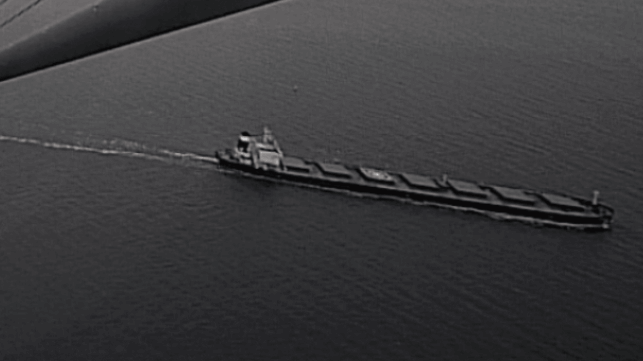By AFP
December 23, 2024

The Yi Peng 3 had been anchored in the international waters of the Kattegat strait between Sweden and Denmark - Copyright Ritzau Scanpix/AFP
Isabel KUA
Beijing on Monday promised to continue “cooperation” with regional authorities over a Chinese ship linked to the recent severing of two undersea cables in the Baltic Sea.
Sections of two telecom cables were cut on November 17 and 18 in Swedish territorial waters of the Baltic.
Suspicions have been directed at a Chinese ship — the Yi Peng 3 — which according to ship tracking sites had sailed over the cables around the time they were cut.
The Yi Peng 3 had been anchored in the international waters of the Kattegat strait between Sweden and Denmark.
Ship tracking site Vesselfinder showed the Yi Peng 3 steaming north out of the strait on Saturday and Sweden’s coast guard confirmed that the vessel had weighed anchor.
Beijing on Monday confirmed the ship had left to “to ensure the physical and mental well-being of the crew”.
“The shipowner company, after a comprehensive evaluation and consultation with relevant parties, decided to resume operations,” foreign ministry spokeswoman Mao Ning said.
“China has notified all relevant countries in advance,” Mao said.
“China is willing to maintain communication and cooperation with the countries involved to advance the follow-up handling of the incident,” she added.
European officials have said they suspect sabotage linked to Russia’s invasion of Ukraine.
The Kremlin has rejected the comments as “absurd” and “laughable”.
On Thursday, authorities from Sweden, Germany and Finland were invited aboard for an investigation led by China.
A Danish representative also accompanied the group as the country had served a “facilitating role” by hosting meetings between the countries earlier in the week, its Foreign Minister Lars Lokke Rasmussen had said.
Sweden in late November requested China’s cooperation in the investigation, but Prime Minister Ulf Kristersson stressed that there was no “accusation” of any sort.
Early on November 17, the Arelion cable running from the Swedish island of Gotland to Lithuania was damaged.
The next day, the C-Lion 1 submarine cable connecting Helsinki and the German port of Rostock was cut south of Sweden’s Oland island, around 700 kilometres (435 miles) from Helsinki.
Tensions have mounted around the Baltic Sea since Russia’s invasion of Ukraine in February 2022.
In September 2022, a series of underwater blasts ruptured the Nord Stream pipelines that carried Russian gas to Europe, the cause of which has yet to be determined.
In October 2023, an undersea gas pipeline between Finland an
China Blocks Investigation of Bulker Suspected of Baltic Subsea Attack

Chinese government officials have refused to let a Swedish prosecutor board a Chinese bulker that was accused of sabotaging subsea cables in the Baltic, according to the Financial Times. The vessel and crew have now departed the region, and they are under way for Egypt - leaving just one last opportunity to apprehend them in NATO member states' waters.
On Nov. 17-18, two subsea cables suddenly broke off the coast of Sweden. AIS data shows that the bulker Yi Peng 3 was maneuvering oddly at the sites where the cables were severed. In addition, one of its anchors is badly twisted, and the damaged cable sites showed clear signs of anchor-dragging on the bottom.
Yi Peng 3 was intercepted by Danish forces as she entered the Great Belt, but she was not halted while transiting Danish waters. Instead, she was allowed to exit the Great Belt and anchored just outside of Danish territorial seas, in the Kattegat. There she remained for a month, guarded by Danish and German vessels - safe from a law-enforcement boarding because she was in international waters.
Sweden - which is leading the investigation - petitioned the Yi Peng 3's flag state for permission to board and inspect the vessel. The flag state, China, said that it would cooperate and then negotiated over the terms of investigators' access for weeks. In the end, Chinese authorities sent their own team to conduct an investigation and allowed European representatives to participate as observers only. Sweden's public prosecutor on the case, Henrik Söderman, was disallowed by Chinese officials and could not board to perform his duties, according to the Financial Times.
"It is remarkable that the ship leaves without the prosecutor being given the opportunity to inspect the vessel and question the crew within the framework of a Swedish criminal investigation," Swedish foreign minister Maria Malmer Stenergard told the FT.
The Yi Peng 3 affair is the second suspected subsea infrastructure attack involving a Chinese vessel in the Baltic in two years, and Lithuanian foreign affairs minister Kestutis Budrys suggested that it is time to take action.
"Building security starts with mitigating weaknesses," said Budrys. "China's unwillingness to cooperate on the undersea incident investigations in the Baltic Sea cannot be allowed to set a precedent in Europe - or anywhere else. If the 'what's mine is mine' mentality becomes a new global norm, it will have to be countered by new navigation rules in EU waters to address vulnerabilities."
As of Sunday, Yi Peng 3 was under way in the North Sea and headed south for the English Channel, putting her on a course to pass through the Strait of Dover - the last point on her route that will put her in jurisdictional reach of Sweden's NATO allies. For the remainder of her declared voyage to Egypt, she will be able to use international waters to transit onwards.
No comments:
Post a Comment